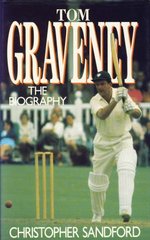Tom Graveney
David Taylor |Published: 1992
Pages: 213
Author: Sandford, Christopher
Publisher: HF and G Witherby
Rating: 3 stars

Christopher Sandford may be better known for his recent biography of Imran Khan, but I was tempted to dig out his 1992 biography of Tom Graveney after twice being reminded of the Gloucestershire, Worcestershire and England batsman in recent weeks. First I read of his association with Arthur Milton, whose life story was reviewed here recently, which was followed by an internet discussion on what players used to do on the rest day of a Test match. The Milton book covered the first of the the two major controversies of Graveney’s career – he left Gloucestershire in somewhat acrimonious circumstances after being replaced as captain by the untested 23 year old Tom Pugh, and by the rules of the time was not able to play for his new county for a year; and in 1969 played in a benefit match (for himself) on the rest day of what turned out to be his last Test, given that he was then dropped as punishment.
Although I never saw him play, I can well imagine that Tom Graveney would have been many people’s favourite batsman, in much the same way that David Gower and Mark Waugh were to later generations (whether today’s Twenty20 fans will get rheumy-eyed in later years thinking of Kieron Pollard and David Warner remains to be seen, in all likelihood I’ll never know). Adjectives like “elegant” and “graceful” were those most commonly appled to his batting; he was predominantly a front-foot player, strong on the off side. It wasn’t all pretty strokeplay though; he was single-minded enough to make some 47,000 runs in first-class cricket, at an average just shy of 45, with 122 hundreds. And he kept going long after amateur contemporaries like Peter May and Ted Dexter had gone off to do Something in the City. Graveney played like he enjoyed the game, but this tended to count against him; the most common charge was that he didn’t take his cricket seriously enough. To be fair it could be said that he under-achieved in the first half of his career. Nor was he necessarily the best choice for a county captain.
The book is largely sympathetic, as you would expect from a biography wriiten in collaboration with its subject, but Sandford does a worthy job, and deals with the two aforementioned episodes in some detail. Graveney was almost lost to the game altogether – after retiring he opened a pub – but he was eventually signed up to do TV commentary for the BBC. The feeling remains though, that more could have been made of him in the May-Dexter-Illingworth era. Well worth seeking out.






Leave a comment